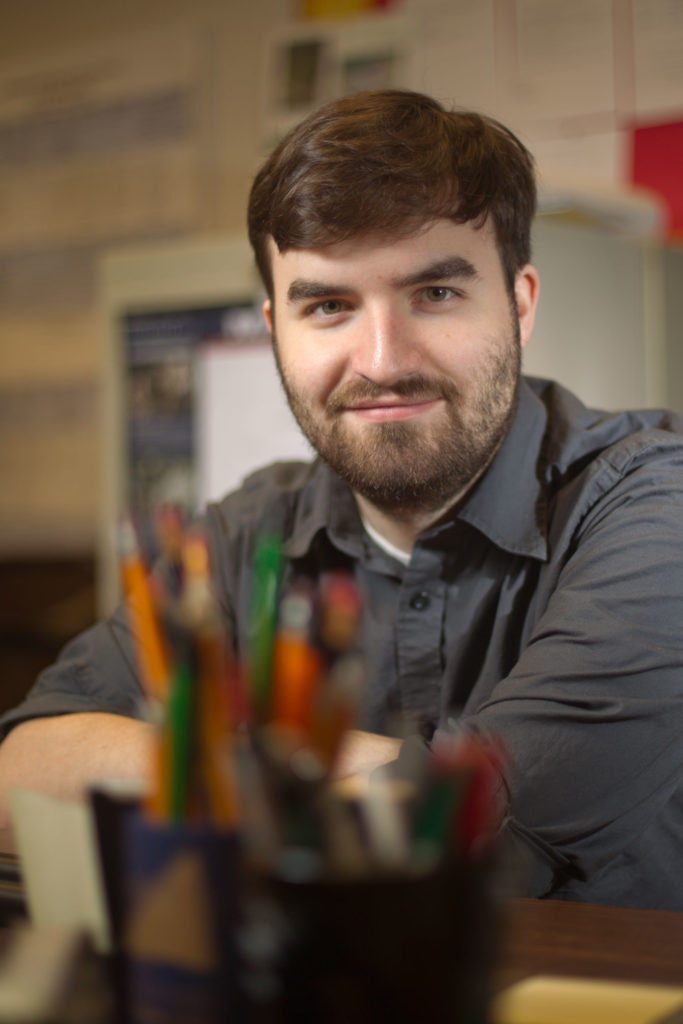After college Truitt Broome did what most students wouldn’t dare: He went back to high school.
Now the former UGA theater major walks the halls of Clarke Central High School in Athens as a college adviser, thanks to his involvement in the first class of UGA’s Georgia College Advising Corps.
The program, begun last year and run out of the Institute of Higher Education, places just-graduated college students in high-need high schools across Georgia. Modeled after Teach for America and funded through private donations, GCAC is one of 15 programs participating in the National College Advising Corps. GCAC selected its inaugural class of four college advisers from dozens of applications.
“For every one of us, it’s different. We all fit into different schools and we’re different people, so we all kind of create our own jobs,” Broome said from behind a laptop screen in the counseling conference room he uses as a part-time office. “I’m a computer guy, so I like to get the students on computers. I like to show them websites that help them learn about colleges and majors and ways to enroll.”
By implementing programs designed to help disadvantaged students learn how to apply to colleges and for scholarships, the advisers work to build a net for students who may otherwise fall through the cracks.
“The Institute of Higher Education has a long-standing commitment to public service as well as instruction and research, and one of the areas where we’ve conducted research is into access to higher education,” said Libby Morris, director of the Institute of Higher Education, vice provost for academic affairs and director of the program. “We’re interested in the pipeline of students moving from high school to college, and we thought this program would be a good opportunity for us to provide a service in an area that we know something about and that we could make a difference in college-going among underserved students in the state.”
Before starting at their schools, the advisers undergo a four-week training session with UGA personnel who are experts in enrollment, financial aid and advising to get a better understanding of the college admissions process to pass on to their students. They also attended the annual NCAC summer leadership institute held this year in Washington, D.C. Throughout the school year, advisers meet regularly to share their progress with each other and brainstorm.
“It’s one of those positions where you can never know enough,” said Ashley Holmes, the adviser at Thomson High School. “I talk to Ryan (Carty, the GCAC counselor at Meadowcreek High in Norcross) and Mamie (Harper, the counselor for Westside High in Augusta) at least once a week. I actually just got off the phone with Ryan. I’m stealing one of his ideas to have a College Awareness Month for the students here.””
The continuing education and training sessions are a big help-especially the first year, Holmes said. But from the outside, the advisers don’t seem to need it. After the program’s first year, each high school requested not only to keep participating in the program, but also to keep their assigned advisers.
“We see that as an important sign of success in the first year,” Morris said. “Going forward, what we want to be able to demonstrate is that the advisers have actually made a difference in college going. The program is working with the national office to establish a database that includes information about the various activities that our advisers use to help students in the process. They do SAT prep, ACT prep, one-on-one advising and help students understand what it means to write an effective college admissions essay.”
By assisting students individually with college preparation, the program hopes to create changes in the schools’ college-going culture, she added. But when the graduating high school seniors leave this summer, so will the advisers. Since part of the program’s mission is to keep the advisers close in age to the students they interact with, the positions are limited to two years.
The GCAC program, however, will continue. Thanks to funding from the Watson- Brown Foundation, AT&T and the Hispanic Scholarship Fund-UGA University Alliance, each of the four high schools will have advisers for at least two more years, although the Institute of Higher Education is hoping to bring the program into additional high-need schools throughout the state.
“We think this program has high value, and we would like to see it expand. Georgia’s college-going rate is not what it needs to be, so one of our goals is to bring that rate up. One of the issues across the state is getting more people to graduate from high school, and aspiring to go to college is one way of getting more people to graduate,” Morris said. “There’s also some thinking that the United States is not keeping up with other countries in the percentage of the population who are going to college and the percentage who are getting advanced degrees, which eventually hurts the overall quality of life. Programs of this type are about individuals-helping them go to college-but they’re also about larger state and societal goals.”
